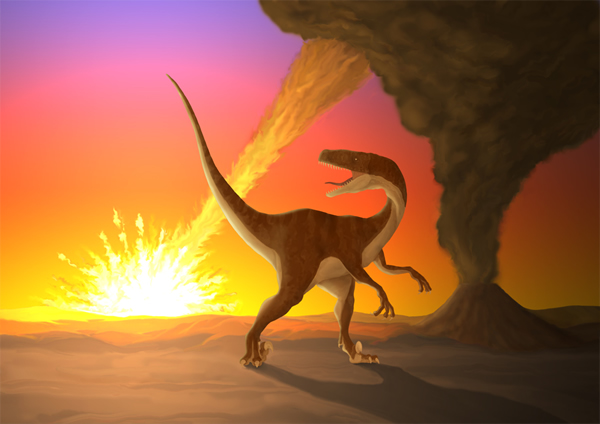A new research of non-avian dinosaur diversity shows they were not in decline and were still capable of generating new species at the time of their extinction by the Chicxulub asteroid hit 66 million years ago (Cretaceous period).
A new research from scientists at the University of Bath and Natural History Museum looking at the diversity of dinosaurs shows that they were not in decline at the time of their extinction by an asteroid hit 66 million years ago.
The researchers say that had the impact not happened, dinosaurs might have continued to dominate the Earth.
Dinosaurs were widespread globally at the time of the asteroid impact at the end of the Late Cretaceous period, occupying every continent on the planet and were the dominant form of animal of most terrestrial ecosystems.
However, it is still contentious amongst paleobiologists as to whether dinosaurs were declining in diversity at the time of their extinction.
Statistical modelling
In order to address this question, the research team collected a set of different dinosaur family trees and used statistical modelling to assess if each of the main dinosaur groups was still able to produce new species at this time.
Their study, published in the journal Royal Society Open Science, found that dinosaurs were not in decline before the asteroid hit, contradicting some previous studies. The authors also suggest that had the impact not occurred, dinosaurs might have continued to be the dominant group of land animals on the planet.
First author of the study, Joe Bonsor, is undertaking his PhD jointly at the Milner Centre for Evolution at the University of Bath and the Natural History Museum.
He said: “Previous studies done by others have used various methods to draw the conclusion that dinosaurs would have died out anyway, as they were in decline towards the end of the Cretaceous period.
“However, we show that if you expand the dataset to include more recent dinosaur family trees and a broader set of dinosaur types, the results don’t actually all point to this conclusion — in fact only about half of them do.”
Sampling bias
It is difficult to assess the diversity of dinosaurs due to gaps in the fossil record. This can be due to factors such as which bones are preserved as fossils, how accessible the fossils are in the rock to allow them to be found, and the locations where palaeontologists search for them.
The researchers used statistical methods to overcome these sampling biases, looking at the rates of speciation of dinosaur families rather than simply counting the number of species belonging to the family.
Joe Bonsor said: “The main point of our paper is that it isn’t as simple as looking at a few trees and making a decision — The large unavoidable biases in the fossil record and lack of data can often show a decline in species, but this may not be a reflection of the reality at the time.
“Our data don’t currently show they were in decline, in fact some groups such as hadrosaurs and ceratopsians were thriving and there’s no evidence to suggest they would have died out 66 million years ago had the extinction event not happened.”
Whilst mammal existed at the time of the asteroid hit, it was only due to the extinction of the dinosaurs that led to the niches being vacated, allowing mammals to fill them and later dominate the planet.
The research was funded by the Leverhulme Trust and Natural History Museum.





























